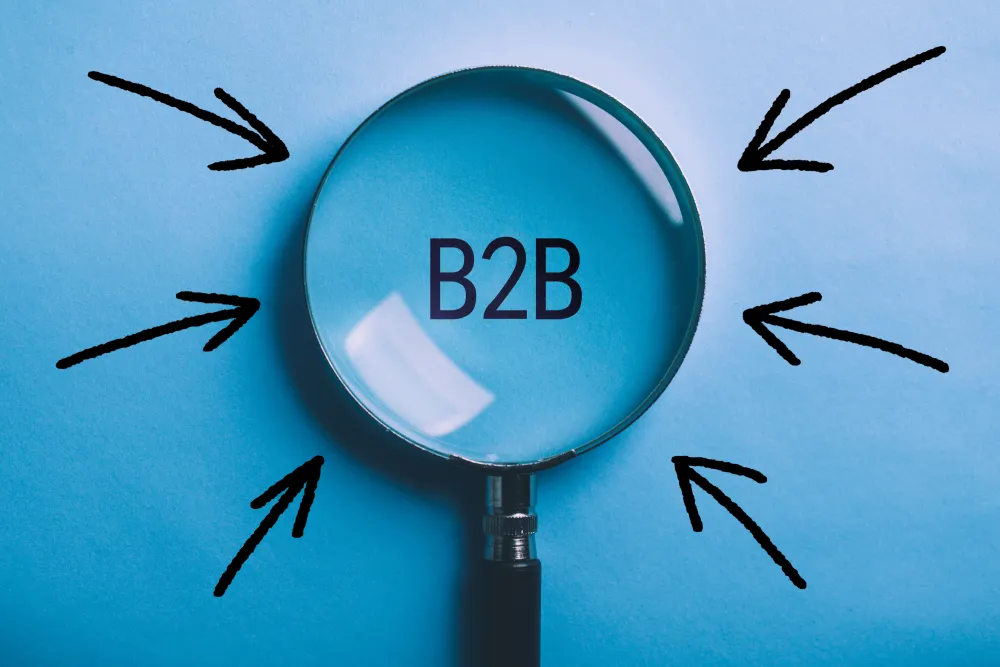
The word B2B under a magnifying glass
B2B SaaS Trends, Statistics and Companies
In the world of business technology, B2B SaaS stands out as a game-changer. Unlike traditional software, B2B SaaS operates in the cloud, so you don't need complex setups or costly hardware. This makes high-tech tools available to smaller companies, not just corporate giants. In this article, we will dive into the world of B2B SaaS, exploring the latest trends, key statistics, and prominent companies.
What is B2B SaaS
B2B SaaS stands for Business-to-Business Software as a Service. Such solutions allow companies to use software hosted on remote servers, typically in the cloud.
B2B SaaS applications cover a wide range of functions. It may include customer relationship management (CRM), project management, accounting, and human resources. These software solutions help businesses operate more efficiently, reduce costs, and improve productivity.
B2B SaaS Statistics
B2B SaaS solutions provide companies with scalable and flexible tools to improve competitiveness in the digital era. Here are the key statistics that prove that B2B SaaS is here to stay:
Global SaaS market size: The global SaaS market has experienced significant growth in recent years, with its market size reaching $197 billion in 2023 and expected to reach $232 billion by 2024.
Shift to the cloud platforms: Most businesses are shifting their operations to the cloud. By 2025, over 85% of organizations are expected to adopt a cloud-first approach. It’s also estimated that cloud-native platforms will host over 95% of new digital workloads by 2025.
The rise of investments: In 2022, companies spent an average ranging from $400,000 to almost $5 billion on SaaS, depending on the company size. Over the upcoming year, companies worldwide intend to boost their investment in SaaS applications by 78%.
B2B SaaS Trends
Understanding the latest trends in the dynamic sector of B2B SaaS is crucial for companies seeking to stay competitive and efficient. Let’s explore the main B2B SaaS trends.
Remote Work Tools
The pandemic sped up the use of remote work tools, and they are likely to remain crucial in the future of work. These apps help employees stay connected and productive no matter where they are. Here are some examples of B2B remote tools:
- Time tracking apps like Traqq, Toggl or Clockify
- Video conferencing platforms like Zoom, Microsoft Teams, and Google Meet
- Project management software like Asana and Trello
- Team messaging tools like Slack
AI and Machine Learning Integration
Artificial Intelligence (AI) and Machine Learning (ML) are getting more important in the B2B SaaS world. These technologies help software systems learn and adapt. For businesses, this means more personalized experiences and smarter decision-making. For instance, AI can analyze customer data to suggest product recommendations or predict market trends. A growing number of companies are adopting AI and ML to make their software more efficient and customer-focused.
Vertical-Specific SaaS Solutions
Vertical-specific SaaS tools are like tailor-made software for specific industries. They're created to meet the special requirements of businesses in a particular field, such as healthcare or finance. These solutions provide industry-specific features and tools, making it simpler for businesses to handle their operations. Instead of using generic software, companies are opting for specialized solutions that understand their industry inside and out.
Data Security and Compliance
Keeping sensitive data safe is a major priority for businesses. With more data breaches happening, companies want software that guarantees their information stays secure. B2B SaaS solutions are focusing on robust security features and compliance with industry regulations, like GDPR or HIPAA, to give businesses peace of mind when using their software.
The Future of B2B SaaS
Let's discuss the potential future trends in the B2B SaaS industry:
SaaS Industry Consolidation: We might see more big companies buying smaller, specialized startups. This consolidation will offer customers all the solutions they need in one package. It will make work easier and less complicated, with fewer software providers to deal with.
Sustainability and Eco-Friendly SaaS: More companies will focus on being environmentally friendly. They will seek software that helps them reduce their impact on the environment. Software providers will respond by optimizing data center operations, employing green energy sources, and implementing features to help businesses track and reduce their environmental impact.
Expansion of Low-Code/No-Code Platforms: Low-code and no-code platforms will keep becoming more popular, letting people without advanced coding skills create and tailor applications. This democratization of software development may empower some businesses to create their own solutions.
AI-Driven Customer Support: Chatbots and virtual assistants powered by AI will become more advanced. They will provide businesses with automated and efficient customer support solutions. AI will reduce response times and ensure round-the-clock availability.
IoT Integration: B2B SaaS solutions will keep working closely with IoT devices. This partnership will allow businesses to gather and study data from many sources. For example, sensors in a factory can send data to a B2B SaaS system. This analysis may help the business improve efficiency and identify areas for improvement.
Leading B2B SaaS Companies
Here, we'll introduce you to some of the top companies in the B2B SaaS industry, showcasing their main products and contributions to the field.
Salesforce
Salesforce is a well-known B2B SaaS company famous for its customer relationship management (CRM) software. Salesforce helps businesses enhance their sales, marketing, and customer service operations. The company's cloud-based solutions provide a 360-degree view of customer interactions. This enables personalized engagement and data-driven decision-making.
Microsoft Azure
Microsoft Azure, a product of tech giant Microsoft, is a leading cloud computing platform for B2B SaaS. Azure provides various services, including infrastructure as a service (IaaS), platform as a service (PaaS), and SaaS. It's a complete solution for businesses looking for flexible and secure cloud resources. With data centers worldwide, Azure provides global reach and reliability. It works smoothly with other Microsoft services like Office 365 and Dynamics 365, which makes work more efficient and helps manage business processes.
Oracle
Oracle is a worldwide B2B SaaS company that provides many cloud-based tools for businesses. Its B2B SaaS portfolio includes database management, enterprise resource planning (ERP), human capital management (HCM), and customer experience (CX) applications. Oracle Cloud offers a secure and scalable infrastructure, helping businesses run important applications and databases effectively.
HubSpot
HubSpot is well-known for its inbound marketing, sales, and customer service software. It offers many tools that help businesses attract, engage, and make customers happy. HubSpot's CRM platform is a central place to handle customer relationships. It includes email marketing, content management, social media marketing, and data analysis. Many small and medium-sized businesses appreciate HubSpot because it helps them expand online and attract more customers.
Slack
Slack is a leading B2B SaaS company specializing in team collaboration and communication software. It offers a chat-based workspace where teams can communicate in real-time, share files, and integrate with various third-party apps. Slack has revolutionized how teams collaborate, particularly in the realm of remote work. It provides channels for organizing discussions by topic, direct messaging for one-on-one communication, and robust search capabilities to find information quickly.
Conclusion
Our examination of B2B SaaS trends, statistics, and industry players has revealed significant growth and evolution in this sector. Looking ahead, it's evident that B2B SaaS will remain a driving force behind enhanced efficiency and sustained growth for businesses. To excel in this ever-changing environment, embracing innovation and staying adaptable will remain essential for long-term success.

